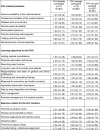Clerkship in primary care: a cross-sectional study about expectations and experiences of undergraduates in medicine
- PMID: 25489344
- PMCID: PMC4259063
- DOI: 10.3205/zma000936
Clerkship in primary care: a cross-sectional study about expectations and experiences of undergraduates in medicine
Abstract
Introduction: With the amendment of the medical licensure act (Approbationsordnung) in 2012, a four-week clerkship in primary care (FHV) became mandatory. We investigated the expectations with which students begin the FHV, which criteria are relevant in selecting the location for the FHV, and the experiences the students had during the FHV.
Method: In a cross-sectional study, all third-year students at both medical schools in Saxony-Anhalt were surveyed in 2013 about their expectations and experiences regarding the FHV. This is the last cohort for which the FHV is optional. Questions were asked about 29 items addressing six topics (personal information, selection of FHV location, selection of FHV medical practice, expectations, experiences, and specialty selection).
Results: Out of a student body of 446, responses were received from N=424 (response rate 95.1%; of which 61.8% female). Of these students, 71 (16.7%) had completed the FHV and 70 (16.5%) were planning to; another 267 students (63%) had not (yet) planned to participate in an FHV. Where a student's parents lived, personal recommendations of a particular medical practice and the attractiveness of the region were the most important criteria for selecting the clerkship site. After completing the FHV, the learning objectives reflected themselves in the experiences of the students in a similar order and significance as in the expectations of students who planned or had not (as of yet) planned to complete the FHV. A relevant influence of the FHV confirming the choice to specialize in general practice or outpatient care was not indicated by those who had completed the FHV.
Conclusion: After location and practice, the FHV is selected according to personal criteria and in connection with prioritized learning objectives. From the students' perspective, the most frequently named learning objectives are also identified as acquired experience after completing the FHV. However, the FHV does not have a reinforcing effect on the selection of general practice as a specialty.
Einleitung: Mit Novellierung der Approbationsordnung für Ärzte 2012 wurde eine vier wöchige Famulatur in der hausärztlichen Versorgung (FHV) obligatorisch. Wir untersuchten daher mit welchen Erwartungen Studierende die FHV beginnen, nach welchen Kriterien FHV-Plätze ausgesucht und welche Erfahrungen in der FHV gemacht werden.Methode: In einer Querschnittserhebung wurden alle Medizinstudierenden des dritten Studienjahres der beiden medizinischen Fakultäten in Sachsen-Anhalt in 2013 zu Erwartungen und Erfahrungen bezüglich FHV befragt. Dieses war der letzte Jahrgang, in dem die FHV fakultativ absolviert werden konnte. Erfragt wurden 29 Items zu 6 Themenkomplexen (Person, FHV-Ortsauswahl, FHV-Praxisauswahl, Erwartungen, Erfahrungen, Fachgebietswahl).Ergebnisse: Von 446 Studierenden antworteten N=424 (Rücklauf 95,1%; davon weiblich 61,8%). Hiervon hatten 71 (16,7%) die FHV absolviert und 70 (16,5%) planten diese, weitere 267 (63%) hatten (noch) keine FHV geplant. Wohnort der Eltern, persönliche Empfehlung der Famulaturpraxis und Attraktivität der Region waren die wichtigsten Auswahlkriterien für den Famulaturort. Nach der FHV spiegelten sich in den Erfahrungen der Studierenden die Lernziele in ähnlicher Reihenfolge und Gewichtung wie in der Erwartungen der Studierenden mit geplanter FHV oder (noch) ohne geplante FHV. Ein relevanter Einfluss der FHV auf die Bestärkung einer Fachgebietswahl für Allgemeinmedizin oder die ambulante Versorgung wurde von den Absolventen der FHV nicht angegeben.Zusammenfassung: Die FHV wird nach Ort und Praxis nach persönlichen Kriterien ausgewählt und mit priorisierten Lernzielen verbunden. Die häufigsten Lernziele werden nach FHV auch als gemachte „Erfahrung“ aus Sicht der Studierenden angegeben. Die FHV wirkt jedoch nicht bestärkend auf die Fachgebietswahl für Allgemeinmedizin.
Keywords: expectation; experiences; general practice; lerkship; primary care.
Figures




Similar articles
-
General practitioners' and students' experiences with feedback during a six-week clerkship in general practice: a qualitative study.Scand J Prim Health Care. 2016 Jun;34(2):172-9. doi: 10.3109/02813432.2016.1160633. Epub 2016 Apr 19. Scand J Prim Health Care. 2016. PMID: 27092853 Free PMC article.
-
The primary care pediatrician's influence on medical student's performance of smoking assessments and counseling.Prev Med. 2005 Jul;41(1):47-52. doi: 10.1016/j.ypmed.2004.08.002. Epub 2004 Nov 10. Prev Med. 2005. PMID: 15916992
-
Undergraduate surgery clerkship and the choice of surgery as a career: perspective from a developing country.World J Surg. 2013 Sep;37(9):2094-100. doi: 10.1007/s00268-013-2073-y. World J Surg. 2013. PMID: 23649528
-
Assessing students' perceptions of the effects of a new Canadian longitudinal pre-clerkship family medicine experience.Educ Prim Care. 2016 May;27(3):180-7. doi: 10.1080/14739879.2016.1172033. Epub 2016 Apr 28. Educ Prim Care. 2016. PMID: 27121287
-
How do longitudinal clerkships in general practice/primary care impact on student experience and career intention? A cross-sectional study of student experience.Educ Prim Care. 2015 May;26(3):166-75. doi: 10.1080/14739879.2015.11494336. Educ Prim Care. 2015. PMID: 26092145
Cited by
-
General practitioners' and students' experiences with feedback during a six-week clerkship in general practice: a qualitative study.Scand J Prim Health Care. 2016 Jun;34(2):172-9. doi: 10.3109/02813432.2016.1160633. Epub 2016 Apr 19. Scand J Prim Health Care. 2016. PMID: 27092853 Free PMC article.
References
-
- Deutscher Bundestag. Sachverständigenrat zur Begutachtung der Entwicklung im Gesundheitswesendes. Sondergutachten des Sachverständigenrates 2009. Koordination und Integration – Gesundheitsversorgung in einer Gesellschaft des längeren Lebens. Berlin: Deutscher Bundestag; 2009. Available from: http://dip21.bundestag.de/dip21/btd/16/137/1613770.pdf.
-
- Kruschinski C, Wiese B, Hummers-Pradier E. Einstellungen zur Allgemeinmedizin: eine vergleichende querschnittliche Befragung von Medizinstudierenden des 1. und 5. Studienjahres. GMS Z Med Ausbild. 2012;29(5):Doc71. doi: 10.3205/zma000841. Available from: http://dx.doi.org/10.3205/zma000841. - DOI - DOI - PMC - PubMed
-
- Buddeberg-Fischer B, Stamm M, Buddeberg C, Klaghofer R. Möglichkeiten zur Attraktivitätssteigerung der Hausarztmedizin aus Sicht junger Ärztinnen und Ärzte. Gesundheitswes. 2008;70:123–128. doi: 10.1055/s-2008-1062721. Available from: http://dx.doi.org/10.1055/s-2008-1062721. - DOI - DOI - PubMed
MeSH terms
LinkOut - more resources
Full Text Sources

